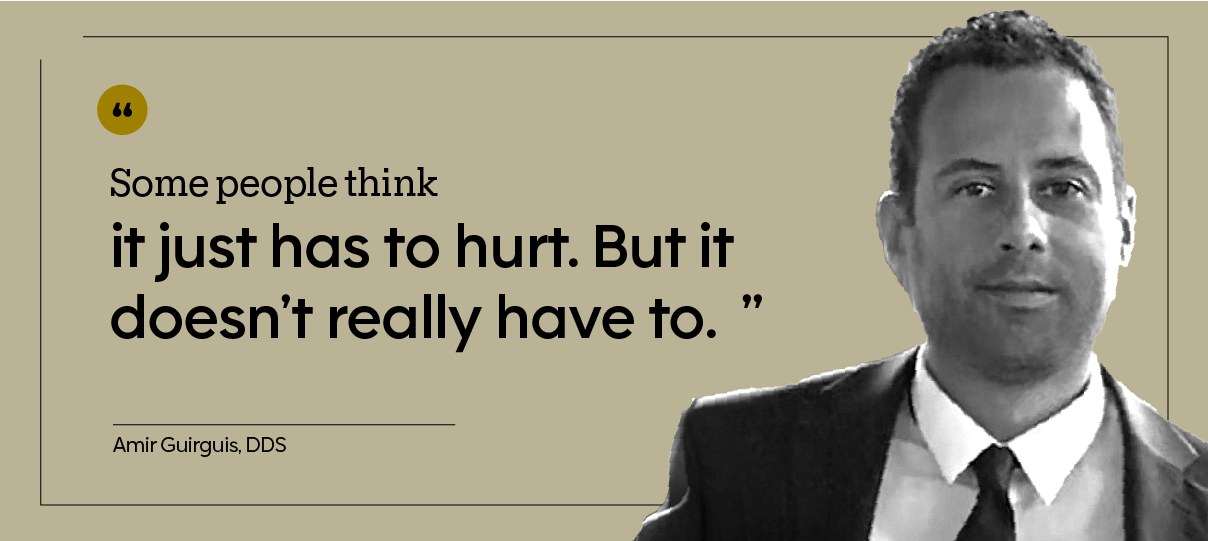Key takeaways:
A root canal is a dental procedure used to treat infection at the center of a tooth.
It’s necessary when the soft tissue inside the root canal becomes inflamed or infected.
While the idea of a root canal may make some people anxious, the procedure itself is typically not painful.
Many people dread getting dental work done. Whether it’s a deep cleaning or a filling, the thought of any procedure with your teeth can be off-putting.
A process often seen as the pinnacle of pain is a root canal. A root canal is a dental procedure to treat and remove infected nerve tissue from your tooth and replace it with a permanent filling. It’s commonly used to treat large cavities or other damage to the tooth.
Contrary to popular belief, a root canal doesn’t have to be painful. Here’s how three people describe getting one.
Her worries were worse than any pain
Tina Willis, a 54-year-old personal injury lawyer in Orlando, Florida, had a root canal “redo” in 2023 for a procedure she originally had done as a teenager.
X-rays showed she needed it, but Tina was hesitant. A few years earlier, she was diagnosed with tinnitus, a ringing in her ear on the same side she needed a root canal. She was afraid the loud noises of a dental procedure could make her tinnitus worse.
Tina didn’t want a permanent ringing in her ear, but she also didn’t want to lose her tooth. After expressing her concerns to her dentist, she decided to get the root canal.
“I was petrified through the whole procedure,” she says.
Search and compare options

She remembers slight initial pain from the numbing shots and a feeling of pressure during the root canal itself. But she mostly remembers worrying that something might go wrong.
“It was long and intense, but it did not hurt,” she says.
Getting through it brought her relief and made her realize the root canal itself was not the cause of her fear.
“It’s kind of weird that something that’s not painful could actually still be kind of stressful,” Tina says.
How much does a root canal cost? Expect to pay around $1,000.
What can you eat after a root canal? Stick to soft foods that don’t require much chewing.
Does it hurt to have your wisdom teeth removed? Three people who’ve had the procedure say to expect some swelling and discomfort.
Dental fear led to procrastination
Sherrill Shepard, a 36-year-old real estate agent from Topeka, Kansas, says her love of sugary foods led to five root canals. “Even though I’ve caused this, it still sucks every time I get a root canal,” she says.
It doesn’t help that she’s afraid of needles and numbing medication.
Her first root canal at age 15 was a horrible experience. Ten years later, she was in a new location and had a better experience. But the process was still challenging.

“I had three teeth that were decayed and broken. And they were painful,” she says.
In April 2024, she had her most recent root canal, which she had been putting off. Her tooth had been hurting for 3 years, and it kept her from chewing on the left side of her mouth. But her dental fears prevented her from getting it fixed.
However, with the support of her husband and her dental care team, she went through with the root canal. She says it was quick and efficient.
“There was no pain,” she says.
Dentist says prevention can help you avoid a root canal
Amir Guirguis, a 44-year-old dentist from Sarasota, Florida, has performed many root canals in his career. But he also remembers having his own root canal in his 20s.
“I had a filling that I had done as a teenager,” Amir says. “There was a cavity underneath the filling that one day exploded. It wasn’t detectable by X-ray. It caused a really bad toothache — of course on a weekend.”
That weekend, he started taking antibiotics to avoid infection. Once the pain subsided, his colleague performed the root canal that Monday morning between other patients.
Today, Amir recommends that his patients ask for an anesthetic to avoid any pain.
“Some people think it just has to hurt. But it doesn’t really have to,” he says. “Generally, the most complaints I get from root canals — especially molars, because they take a little longer — is that people’s jaws get sore from holding their mouth open.”

He says prevention is the key to avoiding a root canal.
“If you have a deep cavity that’s close to needing a root canal, address it before it gets to that point,” he says. “Cavities never get smaller. They only get larger. If you catch it early, that’s going to be the least costly and least painful way to go.”
What does the dentist say?

Shari L. Grigsby-Young, DDS
Dental Medical Reviewer
A root canal is a fairly common dental procedure performed to repair and save your tooth. It involves the removal of the pulp or nerve of the tooth because of infection or injury. Large cavities and cracks in the teeth allow bacteria to enter the pulp. Having a root canal will clean and disinfect the space where bacteria has entered — clearing up any infection that may have formed.
Although many think it’s a painful procedure, having a root canal typically causes very little pain. The dentist will use local anesthesia to numb the area and keep you comfortable.
That being said, large amounts of swelling and infection may lead to more soreness after the numbness has worn off. This may last for a few days. But normally, over-the-counter pain medications can help. If you’re having significant pain, your dental care provider may prescribe a stronger pain medication.

Why trust our experts?

















